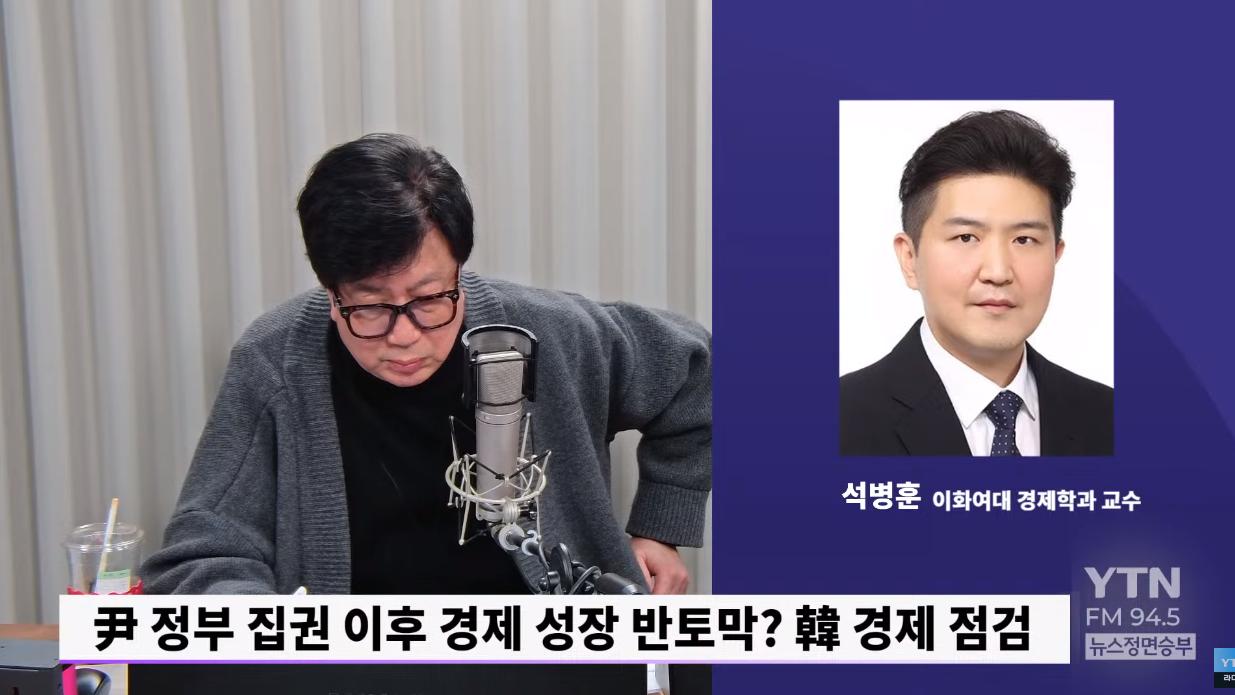■ Broadcasting: FM 94.5 (17:00-19:00)
■ Air date: November 21, 2024 (Thursday)
■ Proceedings: Shin Yul, Professor of Political Science and Diplomacy at Myongji University
■ Talk: Seok Byung-hoon, professor of economics at Ewha Womans University
* The text below may differ from the actual broadcast content, so please check the broadcast for more accurate information.
- Trump completely blanks semiconductor subsidies 'much'
- 'semiconductor subsidies = jobs'...Won't be easy to get rid of
- Virtual assets tax 'premature' to take effect in January next year
◆ Shin Yul: Let's start part 3 of Shin Yul's news head-to-head competition. This is Seok Byung-hoon, a professor of economics at Ewha Womans University, who will meet in the second face-to-face interview of the third part. Professor Seok is here, right?
◇ Seok Byung-hoon: Yes, how are you?
◆ Shin Yul: How are you? Yesterday's news showed that the IMF lowered Korea's economic growth rate by 0.2%. How do you see that?
◇ Seok Byung-hoon: In fact, the momentum of the rebound in domestic demand has slowed more than expected in Korea, so we are also lowering the growth rate this year. Next year's growth forecast is also likely to be bad for Korea's overseas exports if the U.S.-China conflict intensifies next year, so I understand that the economic growth rate for next year has been lowered by considering all of these things.
◆ Shin Yul: No, but I like everything. If you look at the economic growth rate of previous administrations, it was 3.1% during the Park Geun Hye administration and 3% during the Moon Jae In administration, but now it is in the 2% range, and this is in the early stages. Isn't there a problem?
◇ Seok Byung-hoon: In terms of the growth rate and the previous administration. In the case of this year's growth rate, it is expected to be 2.2%, so you can think that domestic and foreign institutions are not very good. However, in the case of the current government, consumer prices have risen 5.2% year-on-year since its inauguration in 2022. And it was 3.6% last year. Isn't this a situation that far exceeds the 2% increase in the consumer price index, the Bank of Korea's price stabilization target? So, in order to curb this inflation, the Bank of Korea raised the base rate sharply and maintained it at 3.5%, and the government inevitably pushed for sound finances to control prices first, so instead of catching prices, the economic growth rate fell at the cost. However, this year's economic growth rate of 2.2% is still higher than the potential growth rate of 2.0%, which is the basic physical strength of the Korean economy, so I think it shows that prices have been effectively controlled without a hard landing in the recession.
◆ Sin Yul: Why did that inflation happen?
◇ Seok Byung-hoon: Inflation is actually both a supply-side factor and a demand-side factor. From the first year of the current government, international grain prices and oil prices have all risen due to the outbreak of the war in Russia and Ukraine. Then, during COVID-19, trade transactions between countries were blocked, and companies' factories were also shut down, so prices rose as the supply of products and services fell sharply. But didn't you spray a lot of cash in the process of overcoming COVID-19? Every country in this country has a disaster support fund, so that kind of cash support is now consumed and guessed, and then it's a demand-side factor, and then it's inflation.
◆ Shin-ryul: So in the end, COVID-19 is the only country that has an unusually low economic growth rate. Is it this difficult for other countries as well?
◇ Seok Byung-hoon: In fact, only the United States has that situation because the economy is doing well while setting prices. In fact, I think Korea is in a much better situation than Europe and other countries because, as I said earlier, while the economic growth rate is expected to be higher this year than the potential growth rate, the inflation rate has been set at 1% for two consecutive months. So this is the kind of situation that has effectively stabilized prices without a recession. So there are other developed countries in Europe that have suffered a severe economic downturn. I think the situation is better than those countries.
◆ Shin Yul: Then Professor Seok Byung-hoon thinks that the economic line is doing well right now.
◇ Seok Byung-hoon: He's doing so well and not doing so well. I'm not in a position to evaluate this. Of course,
◆ Synonym: The scholar can evaluate it.
◇ Seok Byung-hoon: I know that some people are dissatisfied. But isn't it hard to do everything perfectly? So, we have to consider various political situations, and as a result, some aspects that were not met by expectations are also pointed out.
◆ Shin-yul: The reason why I'm asking this is because the president of Yoon Suk Yeol is going to renovate his personnel, but people in the economy say that. Now, the economic line is so passive in everything, and this so-called phenomenon must be overcome and progressive, but it is not doing so. Since we can't do that, this time, we need to focus on those who can actively break the status quo. That's why I asked you.
◇ Seok Byung-hoon: Yes, there might be some of those people's thoughts. Different experts may have different views. In my view, in the current situation, the government cannot actively increase fiscal spending to boost domestic demand. There's also a loss of tax revenue. So the best way to boost domestic demand in the current situation is for the Bank of Korea to cut its key interest rate and ease its monetary policy stance, so the Bank of Korea is actually independent of the government. So, in fact, I think it's a separate issue from changing the economic policy line of the presidential office of Cheong Wa Dae.
◆ Shin Yul: Okay. In the United States, Trump is now in power. But people are worried a lot. I'm worried a lot about the so-called America First, so-called America First. What do you think, professor?
◇ Seok Byung-hoon: In fact, there is a possibility that Korea will be particularly damaged. I also see it like this. The economic policy of the second Trump administration can be summarized into four categories: tax cut policy, protection trade policy, de-environmental policy, and immigration control policy. Among them, the protectionist policies that are expected to be particularly problematic for us are protectionist policies, which are represented by increasing tariffs from 10% to 20% collectively as universal tariffs and imposing 60% tariffs on China. Then, we believe that the de-environmental policy, represented by the abolition of the Inflation Reduction Act, has the greatest impact on Korea. In particular, with regard to protection trade, if we raise tariffs only on us, exports to the United States are likely to be hit. Raising China's 60% high tariff is also related to our exports to China. Exports to China are likely to be hit. This is because the trade structure between China and Korea is that the more China exports to other countries, the more intermediate goods semiconductors in Korea are now used as intermediate goods in Chinese products. Korea's exports to China are automatically increased. However, if China has difficulty in exports, Korea's exports to China are likely to suffer at the same time, so our exports to the U.S. and exports to China account for nearly 40% of Korea's total exports as of last year. So if exports to China and exports to the U.S. are hit at the same time, it may be difficult for Korea to live on exports.
◆ What should I do? Can't you just sit down and beat him?
◇ Seok Byung-hoon: That's right. I know that the government is also devising a lot of measures. But I think some of the most important ways are that we in the U.S. have a trade surplus at an all-time high right now. However, if the U.S. launches the second Trump administration immediately, countries that have a large trade surplus with the U.S. are likely to strengthen trade pressure through bilateral negotiations first. So we need to manage the trade surplus right now. We need to lower it now. That's because in the short term, if we increase imports of energy and stuff from the United States, of course, we increase imports from the United States, so the trade surplus to the United States decreases. There's a way. In addition, in the mid- to long-term, there is a way to bypass exports rather than export directly to the United States. So, in countries with abundant labor and large domestic markets, our companies build overseas production bases in countries where the U.S. has not yet raised trade barriers, and when Korea exports intermediate goods to Vietnam, we can think of making the final product at our company's factory in Vietnam and exporting it to the U.S. Then our trade surplus with Vietnam increases, but our trade surplus with the United States does not. In this way, we believe that we can manage the U.S. trade surplus with the U.S. while avoiding the U.S. tariff barrier.
◆ Sin-ryul: But I've seen it somewhere, and I heard that Mexico is the worst damage if I were to choose a foreign country that will be the worst affected. And our country does not make it to the top 10 in the order of damage. Japan ranked 6th or 7th, and the number of expected damages is the highest. Nevertheless, it means that other countries suffer more damage, right?
◇ Seok Byung-hoon: That's right. In the case of Mexico, a free trade agreement has been signed between the United States and Canada. So we're paying quite a low tariff. China actually built a production base in Mexico, made the final product there, and exported a lot to the United States because it bears almost zero tariffs. So there is a high possibility that there will be a measure to block it while taking this. So, of course, when we build such a bypass export base, countries such as Mexico and Vietnam are targeted now. In the second period of the Trump administration in the United States, there is a need to build overseas production bases in countries with relatively large domestic markets, such as Mexico in Latin America. And then in terms of U.S. trade pressure, when the U.S. listed the countries with the largest trade deficit as of last year in this order. Our country is 8th. Since it is in the 8th place, there is a high possibility that there will be a strong trade pressure from the United States.
◆ Sin-ryul: But this is actually a policy. Furthermore, a country like the United States should not overturn everything that was in the previous administration again just because of a change in government. But I think this Trump will. No, for example, wouldn't the Biden administration overturn all these promises of subsidies for semiconductor loans? How do you see it?
◇ Seok Byung-hoon: I made a pledge like that during the campaign. In fact, in the case of subsidy semiconductors, it is not easy to completely eliminate subsidies. This is because Indiana, Texas, where Samsung Electronics and SK Hynix are building factories in the United States, is a region with strong Republican support. So, if you don't subsidize companies here, you'll see less investment and fewer jobs, you'll see more opposition from local residents. Then it's very likely that House members with local constituencies won't agree to change the semiconductor subsidization bill. So it's hard to completely blank semiconductor subsidies because it's hard to convince lawmakers inside the Republican Party. And many people are actually worried about the inflation reduction law. There are two things we mainly benefit from the inflation reduction law. One is subsidizing electric vehicles. So, thanks to this, we, Hyundai-Kia, have helped increase our electric vehicle market share in the United States. It's possible to eliminate this, which, as far as I know, has a lot of consensus within the Republican Party of the United States. So, there is a high possibility that electric vehicle subsidies will be abolished. On the other hand, there are other subsidies related to renewable energy. For example, we built in the United States, subsidies from secondary battery companies and factories, and for the same reason, these factories are investing in areas with strong Republican support, so the law needs to be changed. There are a lot of House Republicans who oppose it. It's hard to abolish subsidies related to renewable energy because it's hard to get congressional consent. I'm looking at it like this.
◆ Sin Yul: And the other thing is the issue of virtual currency like Bitcoin. Now, Trump seems to have even said that he will now stockpile virtual currency, bitcoin, and other things at the national level. However, the Democratic Party of Korea and the Democratic Party of Korea will implement virtual asset taxation. Aren't you talking about this right now?
◇ Seok Byung-hoon: Yes, that's right. Originally, the law to tax virtual assets is scheduled to take effect in January next year. In fact, we tried to implement it several times, but the postponement continued, so it was postponed until January next year. However, according to a recent report by the Democratic Party of Korea, if the original income deduction is raised from 2.5 million won to 50 million won a year, in fact, you don't have to pay taxes on virtual asset investments unless you make a profit of 50 million won. This is why there are reports that internally decided to implement it from January next year. However, in fact, I believe it is too early to impose virtual asset taxation and implement it immediately from January next year. Because there are many ways to avoid taxes right now. So people who traded virtual assets through domestic exchanges have to pay taxes, but it is difficult to find out the financial resources if they use overseas exchanges or earn income through personal transactions. Now, this is a situation where the unfairness of taxation cannot be countered. So, we need to tax it after we have all these systems in place. I'm in favor of postponement because I'm looking at it like this.
◆ Shin Yul: Yes, I see. I'll stop here today's talk. Thank you.
◇ Seok Byung-hoon: Yes, thank you.
◆ Shin Yul: This has been Seok Byung-hoon, professor of economics at Ewha Womans University.
[Copyright holder (c) YTN Unauthorized reproduction, redistribution and use of AI data prohibited]
Politics
More- Ministry of Foreign Affairs issues 'no travel' to all regions of Lusk
- The ruling party, the Democratic Party of Korea's amendment to the Commercial Act called a "self-inflicted bill to promote corporate food and
- 'Drunk Driving Controversy' Kang Ki-hoon, the presidential office's administrator, expressed his resignation.
- "On the 28th, the report of impeachment by the chief of the Central District Prosecutors' Office"... "Anger-style impeachment show."






![[Site Y] "Acting you've never seen before"..."Hyperknife" Park Eunbin is a doctor this time.](https://image.ytn.co.kr/general/jpg/2024/1121/202411211747565909_h.jpg)



